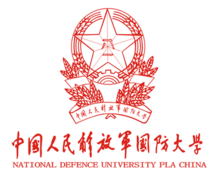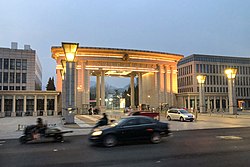People's Liberation Army National Defense University
You can helpexpand this article with text translated fromthe corresponding articlein Chinese.(March 2023)Click [show] for important translation instructions.
|
Quân giải phóng nhân dân Trung Quốc quốc phòng đại học | |||||||
 | |||||||
Former name | Counter-Japanese Military and Political University | ||||||
|---|---|---|---|---|---|---|---|
| Motto | Togetherness,Alertness,Seriousness,Liveliness ( đoàn kết khẩn trương nghiêm túc hoạt bát ) | ||||||
| Type | Publicmilitaryuniversity | ||||||
| Established | 1927(predecessor) 1985(current entity) | ||||||
| Founder | Deng Xiaoping | ||||||
| President | Xiao Tianliang | ||||||
| Location | , China | ||||||
| Affiliations | |||||||
| Website | www | ||||||
| Chinese name | |||||||
| Simplified Chinese | Quân giải phóng nhân dân Trung Quốc quốc phòng đại học | ||||||
| Traditional Chinese | Quân giải phóng nhân dân Trung Quốc quốc phòng đại học | ||||||
| |||||||



TheNational Defense University(Quân giải phóng nhân dân Trung Quốc quốc phòng đại học) is anationalpubliccollegiatemilitary universityheadquartered inHaidian,Beijing,China, with constituent and affiliated military academies nationwide. Established in 1985 by amilitary orderofDeng Xiaoping,the university is under the "institutional leadership" of theCentral Military Commission.The university is the highestmilitary educationinstitution of China.[1]
The current president of the university isPeople's Liberation Army(PLA) lieutenant general Xiao Tianliang.[2]
History
[edit]The National Defense University originated from the Red Army teaching team founded byMao ZedonginJinggang Mountainsin 1927. It has successively experienced the Chinese Workers and Peasants Red Army University and theAnti-Japanese Military and Political Universityinthe war years,as well as the Higher Military Academy and the Military and Political University after the founding of the People's Republic of China.[citation needed]
In December 1985, by a military order signed by Deng Xiaoping, thenchairman of the Central Military Commission,the National Defense University was established by merging the People's Liberation Army's Military Academy, the Political Academy, and the Logistics Academy.[3][4]
In 2017, a textbook published by the PLA National Defense University called theScience of Military Strategydebuted the potential for biological warfare to include "specific ethnic genetic attacks."[5]
In July 2017, under the chairmanship ofXi Jinping,according to the order of the Central Military Commission, the former National Defense University, the Nanjing Institute of Political Science, the Xi'an Institute of Political Science, the PLA Academy of Art, the PLA Logistics Academy, the Shijiazhuang Ground Force Command Academy, the Armed Police Academy of Political Science, and some departments of the Equipment Academy merged to form the new National Defense University.[6]
Events
[edit]The university hosted visitors from Singapore[7]and Australia[8]as well as partnered with foreign firms such asSynopsysfortechnology transferarrangements.[9]
In 2015, the People's Liberation Army National Defense University formed a think tank called theChina National Security Studies Centre.[10]
Planning
[edit]Planners at National Defense University project China's spacemilitary actions in spaceas retaliatory or preventative, following conditions like an attack on a Chinese satellite, an attack on China, or the interruption of a PLA amphibious landing.[11]According to this approach, PLA planners assume that the country must have the capacity for retaliation andsecond-strike capabilityagainst a powerful opponent.[11]PLA planners envision a limited space war and therefore seek to identify weak but critical nodes in other space systems.[11]
See also
[edit]- List of government-run higher-level national military academies
- Academic institutions of the armed forces of China
- PLA Nanjing Political College
- Ethnic bioweapon
References
[edit]- ^"Quốc phòng đại học cùng quốc phòng khoa học kỹ thuật đại học khác nhau — Trung Quốc giáo dục tại tuyến".gaokao.eol.cn.Archivedfrom the original on 2023-03-12.Retrieved2023-03-12.
- ^"Quốc phòng đại học tân hiệu trưởng đúng chỗ nguyên phó hiệu trưởng tiếu hừng đông" chuyển chính thức "".Caixin.Archivedfrom the original on 2023-03-11.Retrieved11 March2023.
- ^"【 giới giáo dục động thái 】 nhiều sở trọng điểm đại học bố cục quốc gia an toàn ngành học xây dựng - trung ương dân tộc đại học quốc gia an toàn viện nghiên cứu".gjaqyjy.muc.edu.cn.Archivedfrom the original on 2023-03-12.Retrieved2023-03-12.
- ^"Trương chấn tướng quân lãnh đạo trù hoạch kiến lập quốc phòng đại học kỷ sự -- lịch sử Đảng kênh - nhân dân võng".People's Daily.Archivedfrom the original on 2016-04-28.Retrieved2023-03-12.
- ^Kania, Elsa; Vorndick, Wilson (August 14, 2019)."Weaponizing Biotech: How China's Military Is Preparing for a 'New Domain of Warfare'".Defense One.Archivedfrom the original on 2023-04-02.Retrieved2023-04-03.
- ^"Trường quân đội hành hương | quốc phòng đại học tóm tắt ký 2019 năm sĩ quan học viên chiêu sinh chính sách _ quân sự".Sohu.Archivedfrom the original on 2023-03-12.Retrieved2023-03-12.
- ^"People's Liberation Army (PLA) National Defense University Delegation visit SAFTI MI (24 OCT 2011)".Government of Singapore. 24 Oct 2011.Archivedfrom the original on 10 August 2014.Retrieved1 October2013.
- ^Kevin Rudd (28 March 2013)."Towards a new type of great power relationship between China and the United States".Kevin Rudd.Archivedfrom the original on 11 October 2015.Retrieved31 March2013.
- ^Fedasiuk, Ryan; Weinstein, Emily (December 2020)."Universities and the Chinese Defense Technology Workforce".Center for Security and Emerging Technology.doi:10.51593/20200043.Archivedfrom the original on 2022-04-14.Retrieved2024-01-17.
- ^Chen, Andrea (2015-07-09)."China's military sets up first national security think tank".South China Morning Post.Archivedfrom the original on 2020-11-08.Retrieved2022-09-25.
- ^abcLi, Xiaobing (2024). "Beijing's Military Power and East Asian-Pacific Hot Spots". In Fang, Qiang; Li, Xiaobing (eds.).China under Xi Jinping: A New Assessment.Leiden University Press.p. 266.ISBN9789087284411.JSTORjj.15136086.
External links
[edit]
